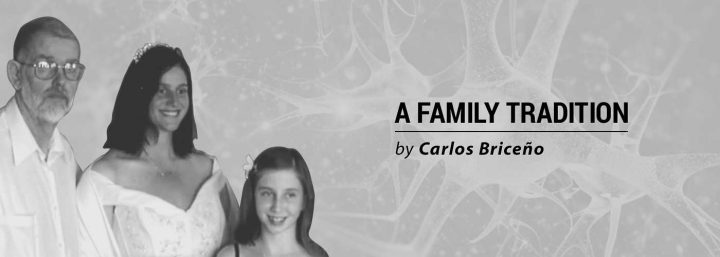Social Worker Emily Zivin Provides Tips on Caregiving and Burnout
Written by |

Emily Zivin is a licensed clinical social worker at Northwestern Memorial Hospital’s Movement Disorders Center in Chicago, one of the Huntington’s Disease Society of America’s Centers of Excellence. My wife, Jill, and I know her from Jill’s visits there.
We find her to be effervescent, highly knowledgeable, empathetic, and extremely caring. After a recent visit, I thought it would be wise to ask her questions about caregiving. Following is an excerpt of our conversation:
CB: What are some of your tips to help Huntington’s disease caregivers avoid burning out?
EZ: Caregivers need to make themselves just as important [as the person they’re caring for] because a life is a life. It’s important for caregivers not to lose themselves in the caregiving. Connect with friends. Get out of the house. Ask for help.
That’s the biggest thing. People are so afraid to ask for help and let people in because they’re afraid of the response they’re going to get. But most people in their communities, [along with] their friends, are innately good, and when they understand what is happening, they want to help.
Exercise. That’s so important. Connecting to other people in the HD community is really important. A lot of people don’t, but those who do go to a lot of the in-person meetings and [join] online support groups.
Sometimes, because there are so many Facebook groups and chat groups, there’s too much information or information that scares other people or just becomes an overload. Being in an environment where you are supported by someone facilitating the group and making sure things stay safe and healthy and moving in the right direction are all important.
Today, I was helping someone who was totally overwhelmed in caregiving. One thing that’s super expensive, but for people who have the financial resources, outsourcing some of [the caregiving] and getting a case manager to help is a really good tool.
Most people can’t go that route. When you can, bring someone into the home who is not directly impacted, but who can be the traffic guide, the person directing the street traffic. I think that’s helpful, having someone come in and come up with a plan. What are we going to do for this or that? How are we going to handle things financially, and what do you think about long-term care?
Having someone else outside your family is always helpful.
Where do you find a person like that?
The service I refer people to for long-term care is Elderwerks. It’s a free service. … Elderwerks can provide a case manager who can provide a resource list of online services, where you can pay a flat rate and have someone virtually helping you.
Elderwerks provides referrals for long-term care but can also provide referrals for case management.
What do you recommend for caregivers who deal with HD family members who are in denial or afraid to deal with a loved one who has the disease?
It’s very important to set expectations for yourself and not set expectations for anyone else. It’s really hard for families.
I am going to give you an example. There is a family I am helping whose husband/father is in a nursing home. The mother and sister spoon-feed the father most meals. They also have a younger sister who has a young family, and they can’t do that. She is very angry at her sister.
I always say to her, “You have to set expectations. Just because this is something you want to do, and the rest of the family has decided to do, it doesn’t mean that family member is a bad person, because that is not something they want to do.”
I think it’s sort of training yourself to be like, this is what I can do, and realize that not everyone is going to be able to do that, because HD impacts people so differently.
So many people don’t want to talk about it. Some people want to talk about it all the time. Some people totally run away and move away from their family not to deal with it. I think it’s really important to acknowledge the fact that everyone’s journey is different.
It’s important to set realistic expectations of what the caregiver wants to do and, realistically, what they can expect from their family members. That might include having an open conversation: “This is what I want from you. I realize you might not be able to do this for me, but what can you do?”
***
Note: Huntington’s Disease News is strictly a news and information website about the disease. It does not provide medical advice, diagnosis, or treatment. This content is not intended to be a substitute for professional medical advice, diagnosis, or treatment. Always seek the advice of your physician or other qualified health provider with any questions you may have regarding a medical condition. Never disregard professional medical advice or delay in seeking it because of something you have read on this website. The opinions expressed in this column are not those of Huntington’s Disease News or its parent company, Bionews Services, and are intended to spark discussion about issues pertaining to Huntington’s disease.



Leave a comment
Fill in the required fields to post. Your email address will not be published.